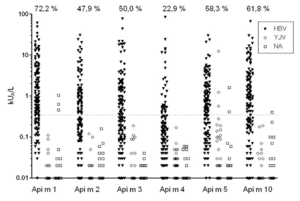
Allergy is a disease in which the immune system reacts heavily to molecules, allergens, that are generally harmless but exhibit the potential to activate effector cells via IgE-mediated receptor cross-linking.
In allergy research we focus in isolation, recombinant production, characterisation and engineering of allergens with special emphasis on insect venom and pollen allergens. In the last years venomics of different hymenoptera species enabled us to identify novel proteinic compounds, to characterise the relevance of carbohydrate structures and to assess the clinical relevance of these proteins in recombinant form. By providing novel allergens we develop strategies for optimisation of the specific immunotherapy and the design of hypoallergenic variants.
One of the most severe hypersensitivities is observed in hymenoptera venom allergy. Here molecular information is used for therapeutic and diagnostic applications, but also can be used to sharpen our understanding of antibody responses to immunogenic epitopes, to elucidate the basis for high affinity recognition and to understand the clinical relevance of individual target structures.
Complementary we aim for analyses of the interaction of allergens with allergen-specific antibodies and their receptors. Therefore we address the current unavailability of such antibodies by combinatorial approaches backed with recombinant antibody technologies. This is especially true for the lowest abundance isotype IgE and the “protective” antibodies of the IgG subclasses.
IgE is an extraordinary powerful isotype that exhibits highest affinities and exerts strong immune reactions to lowest amounts of target structures. Elucidating this interaction can help to understand the nature of the interplay of the immune system with pathogens and antigens and thus to develop strategies for intervention or vaccination.